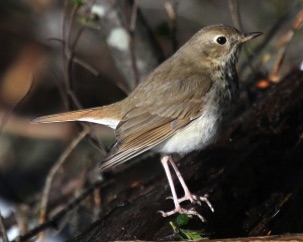Thrush Music: American Poet-Naturalists and the Poetics of Loss | p 5
When we come that place, the song of loss becomes a song of healing: the song of the Wood Thrush, Hermit Thrush, or Veery.
Hermit Thrush
For Whitman, the Mockingbird's "reckless despairing carol" gives way to the "liquid and free and tender" song of the Hermit Thrush in "When Lilacs Last in the Dooryard Bloom’d." In this song of mourning for Lincoln, the speaker's consolation comes through a return to the world of the senses: the smell of lilac, the sight of the evening star, and the "pure deliberate notes" of the Hermit Thrush. This is the song of the integrated self: "Lilac and star and bird twined with the chant of my soul,/ There in the fragrant pines and cedars dusk and dim."
As I came to the edge of the woods,
Thrush music—hark!
Now if it was dusk outside,
Inside it was dark.
To dark in the woods for a bird
By sleight of wing
To better its perch for the night,
Though it still could sing.
The last of the light of the sun
That had died in the west
Still lived for one song more
In a thrush's breast.
Far in the pillared dark
Thrush music went—
Almost like a call to come in
To the dark and lament.
But no, I was out for stars:
I would not come in.
I meant not even if asked,
And I hadn't been.
Robert Frost's "Come In" also presents an evening walker, out for stars, hearing the call of the thrush. But Frost will not let us lose sight of the difference between speaker and bird.
